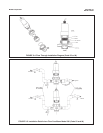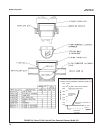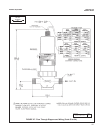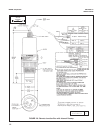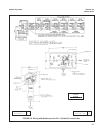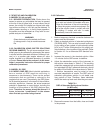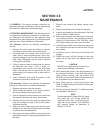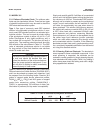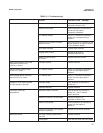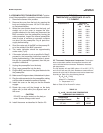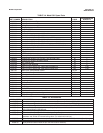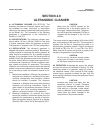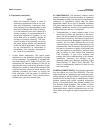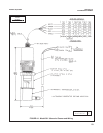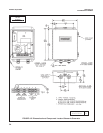
17
Trouble Probable Cause Remedy
Meter reads off scale. Reference electrolyte depleted. Replace reference electrolyte as
instructed in Section 3.2.2.
Defective preamplifier. Check preamplifier as instructed in
Section 3.4 and replace
preamplifier if defective.
T.C. element shorted. Check T.C. element as instructed in
Section 3.5, and replace body if
defective.
Electrode not in solution or sample Make sure sensor is in solution or that
stream is not full. sample stream is full (refer to Section
2.0 for installation details).
Open glass electrode. Replace glass electrode.
Plugged liquid junction. Replace liquid junction.
Recharge reference cell.
Reference element open- Replace reference element.
no contact.
Meter reads between 3 and 6 pH Electrode cracked. Replace electrode.
regardless of actual pH of
solution or sample.
Meter indication swings widely T.C. element shorted. Check T.C. element as instructed in
in AUTO T.C. Mode. Section 3.5 and replace body if
defective.
Span between buffers extremely T.C. element open. Check T.C. element as instructed in
short in AUTO T.C. mode. Section 3.5 and replace body if
defective.
Sluggish or slow meter indication Electrode coated. Clean electrode as instructed in
for real changes in pH level. Section 3.2.1.
Electrode defective. Replace electrode.
Transmitter cannot be Electrode coated or cracked. Clean electrode as instructed in
standardized. Section 3.2.1 and, if cracked,
replace electrode.
Reference chamber is contaminated Replace gel solution as
instructed in Section 3.2.2.
Defective preamplifier. Check preamplifier as instructed in
Section 3.4 and replace if
defective.
If trouble still persists, micro-junction Replace micro-junction electrode.
electrode is defective.
Meter short spans. Old glass electrode (greater than 1 Replace electrode.
year use).
Coated glass. Clean with soft cloth and clean water.
TABLE 3-1. Troubleshooting
MODEL 381pH/ORP SECTION 3.0
MAINTENANCE



